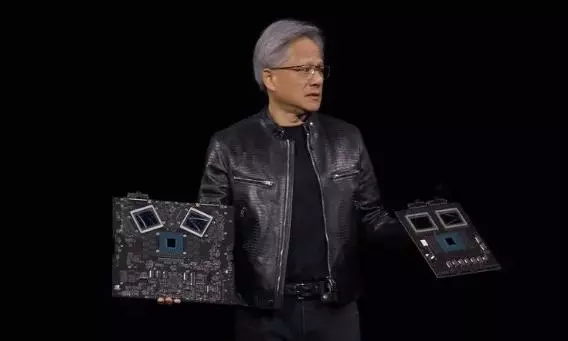
Nvidia to manufacture its AI supercomputers entirely in the US
Nvidia says it has commissioned more than 1 million square feet of manufacturing space and its Blackwell AI chips have started production in Phoenix

Nvidia, a chipmaker which spearheads much of the artificial intelligence (AI) boom, has announced plans to produce NVIDIA AI supercomputers entirely in the US — for the first time.
The company said it will make up to $500 billion of AI infrastructure in the US through its manufacturing partnerships over the next four years.
A buoyant White House immediately put out a blog post describing Nvidia’s announcement as the “Trump effect in action”. It was a reference to the high tariffs US President Donald Trump has imposed across the world.
Also read: AI | DeepSeek’s deep strike and the humbling of American Big Tech
Nvidia announcement
Nvidia CEO Jensen Huang said: “Adding American manufacturing helps us better meet the incredible and growing demand for AI chips and supercomputers, strengthens our supply chain and boosts our resiliency.”
In a bid to cut ballooning trade deficit and to bring home production units, Trump has announced a 32 per cent tariff on products from Taiwan, where Nvidia now largely makes its graphics processing units or GPUs.
Trump tariffs
Trump also clamped a whopping 145 per cent tariffs on products from China, where tech giant Apple makes its iPhones and other products.
But on Friday, Trump exempted chips as well as smartphones, computers and other tech devices and components from the tariffs.
Nvidia said it had commissioned more than 1 million square feet of manufacturing space.
Also read: DeepSeek disrupts, Nvidia crumbles: Chinese AI start-up sparks $465B tech meltdown
Nvidia plans
Its Blackwell AI chips have started production in Phoenix. In Arizona, Nvidia will partner with Amkor and Siliconware Precision Industries, which provide chip packaging and testing services.
The company designs its GPUs, but outsources its chip production to contract manufacturers.
Nvidia is also building manufacturing plants for its supercomputers in Texas, partnering with Foxconn in Houston and with Wistron in Dallas, it said. It hopes to reach mass production at both facilities within 12-15 months.
